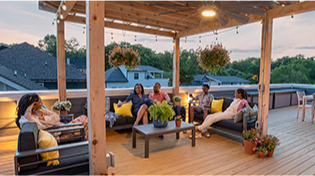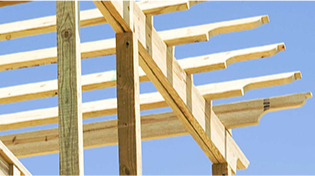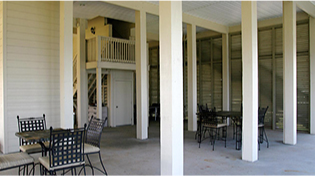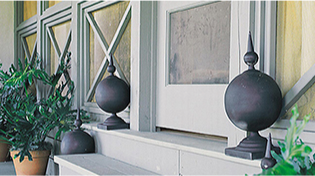Ground Contact Pressure Treated Lumber
Treated with more preservative than above ground treated products, ground contact pressure treated pine has a higher preservative retention level, resulting in improved performance when exposed to soil, poor ventilation, moisture and fresh water.
When compared to above ground treated lumber, YellaWood® brand ground contact pressure treated pine products offer twice the protection to withstand the adverse effects of being close to or in the ground, providing added protection against rot, fungal decay and termite attack.
This enhanced protection delivers peace of mind, even for projects above ground, making it ideal for multiple outdoor applications.
The Ultimate Backyard Book.
Find inspiration, building tips and ideas for your next project.
EXPLORE POSSIBILITESGround Contact Lumber Applications
Dimensional Lumber
A basic building component and critical to the performance and safety of your structure.
DIMENSIONAL TIMBERS
The building block of many outdoor building projects – supporting your deck, dock and fence.
PRESSURE TREATED BOARDS
For appearance-driven applications that don’t require them to carry a heavy load.
Product Availability
APPLICATION
NOMINAL DIMENSIONS
Decking
Dimensional Lumber
Dimensional Timbers
Pressure Treated Boards
Frequently Asked Questions
WHAT DOES GROUND CONTACT MEAN?
Ground contact means that the lumber product is approved for use in applications that require the component to be either placed close to, on or directly in the ground (ground level decks, fence or deck posts, landscaping, walkways, etc.). Ground contact also applies to products used in above ground applications when the components are subject to hazards comparable to ground contact or are used in applications that are difficult to maintain, repair or replace and are critical to the performance and safety of the structure (deck joists, beams, ledger boards, etc.)
GROUND CONTACT VS. ABOVE GROUND LUMBER – WHAT IS THE DIFFERENCE?
Ground contact rated lumber is lumber that should be used for projects or structures that physically touch the ground or are exposed to environmental conditions and challenges that higher moisture levels present. Treated with more preservative than above ground treated products, ground contact pressure treated pine provides twice the protection against rot, fungal decay, and termite attack. On the other hand, above ground lumber is meant for applications that are six inches or more above the ground. Treated with less preservative than ground contact treated products, above ground pressure treated pine is formulated primarily for protection against the sun and weather.
When Should I Use Ground Contact Treated Lumber?
Ground contact treated products should be used in applications where the components are:
- Difficult to maintain, repair or replace and are critical to the performance and safety of the structure (joists, beams, ledger boards, etc.)
-
Subject to hazards comparable to ground contact such as:
- Less than six inches from the ground
- At risk for poor air circulation
- At risk for poor water drainage
- Likely to have prolonged contact with vegetation or leaf litter
- Exposed to frequent wetting such as freshwater docks, sprinkler systems, swimming pools and hot tubs
How is Ground Contact Lumber Treated?
YellaWood® brand pressure treated products, including ground contact, are treated in a pressurized cylinder. The treatment process forces a waterborne micronized copper preservative and co-biocide deep in the cellular structure of the wood providing long-term protection against rot, fungal decay and termite attack.
HOW DO I KNOW WHICH LUMBER IS GROUND CONTACT VS. ABOVE GROUND?
YellaWood® brand products are available in a number of different treatments for a variety of applications. By simply reading the end tag on each piece of lumber, the end user will be able to determine if a product is approved for use in "ground contact" or "above ground" applications. Make sure the lumber matches your needs and the requirements of your local building code by checking the end usage which is noted at the top of the tag.
How Long Will Ground Contact Lumber Last?
While multiple factors including climate and end-use will determine the durability and longevity of your ground contact lumber, regular maintenance can extend the life of pressure treated wood by many years. Applying a water repellent sealer annually, cleaning with a mildewcide, and clearing snow, debris and leaves will prevent premature rot and help maintain its natural beauty.




